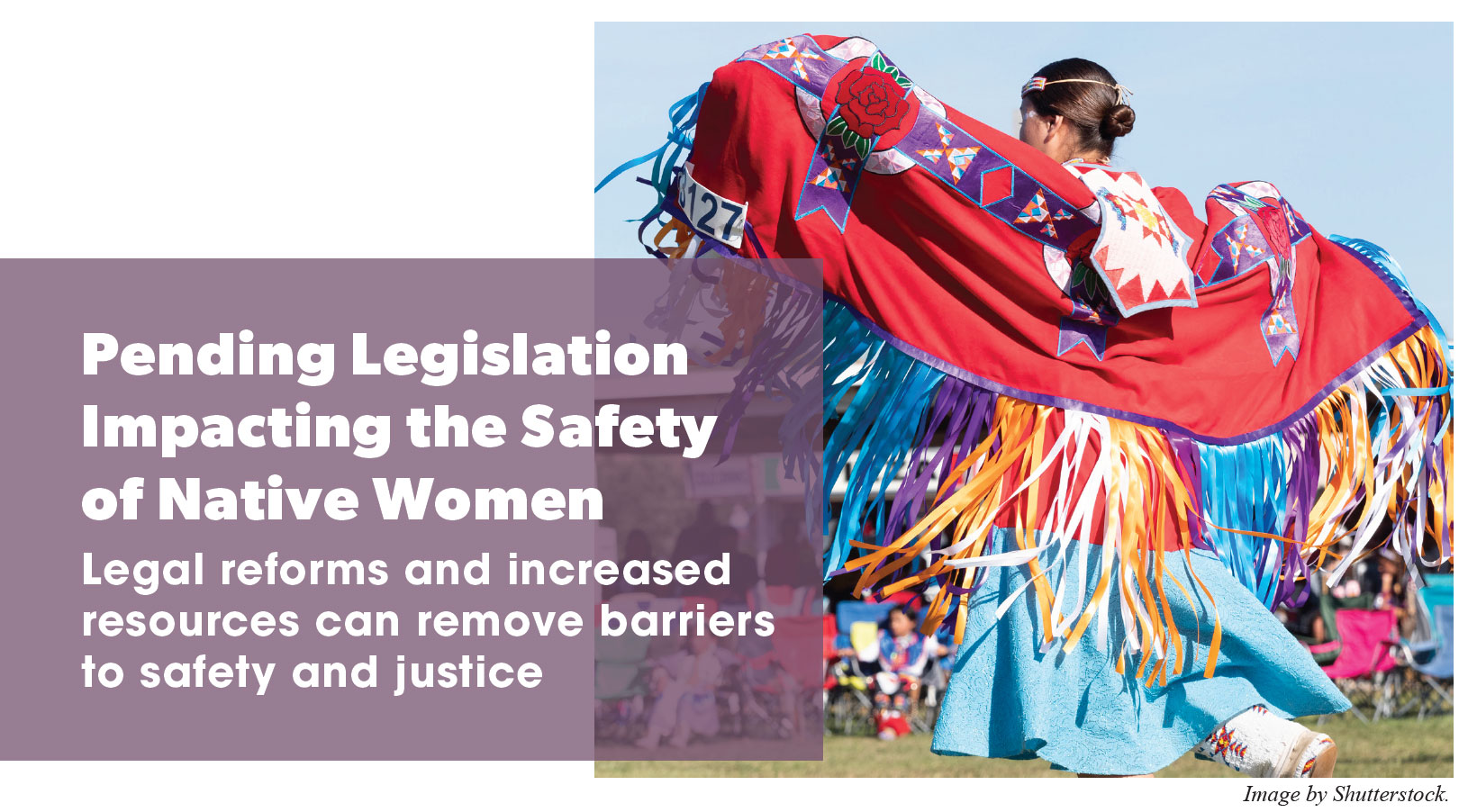Pending Legislation Impacting the Safety of Native Women

Violence Against Women Act (VAWA)
Last reauthorized in 2013, the authorization for VAWA expired in 2018. On April 4, 2019, the House of Representatives passed a bipartisan VAWA Reauthorization bill (H.R. 1585), developed in partnership with the national and tribal advocacy organizations. H.R.1585 includes critical resources for tribes to implement VAWA and necessary lifesaving amendments to enhance tribal sovereignty and safety for Native women. H.R.1585 is widely supported across Indian Country.
Bipartisan negotiations in the Senate unfortunately broke down and have resulted in two Senate bills to reauthorize VAWA.
On November 13, 2019, Senator Dianne Feinstein (D-CA) introduced a companion Senate Bill S.2843 to H.R. 1585 to reauthorize VAWA. This bill closely mirrors the language contained in the bipartisan, advocate-supported H.R. 1585 and is inclusive of the important tribal provisions that tribal leaders and advocates strongly support. For more information on these VAWA proposed tribal provisions, visit bit.ly/37458N3.
On November 20, 2019, Senator Joni Ernst (R-IA) introduced S.2920 to reauthorize VAWA. This legislation, while inclusive of Indian tribes if enacted, would destabilize tribal justice systems by imposing burdens and restrictions on tribal courts far beyond those imposed on federal and state courts, including audits by the Attorney General and the stripping of sovereign immunity, which leaves Indian tribes vulnerable to lawsuits by defendants of tribal courts. Ultimately, this bill would eliminate the gains made in VAWA 2013 and infringe on the inherent authority of tribal nations to prosecute crimes committed against their citizens on tribal lands.
Family Violence Prevention and Service Act (FVPSA)
The Family Violence Prevention and Services Act authorization expired in 2015. The FVPSA provides critical support for shelters, coalitions, training and technical assistance centers, children’s services, emergency response hotlines, and prevention initiatives. The FVPSA is the only federal grant program solely dedicated to domestic violence shelter and supportive services. It is the primary source of funding for these services for Indian tribes (see story pg. 61).
Bridging Agency Data Gaps and Ensuring Safety Act (BADGES Act)
Introduced in both the Senate (S.1853) and the House (H.R. 4289), the BADGES Act aims to improve law enforcement recruitment, Tribal access to federal criminal databases, and coordination between federal, state, tribal, and local law enforcement agencies.
Finding and Investigating Native Disappearance Act (FIND Act)
Introduced in the Senate, the Find Act (S.1893) aims to require the Comptroller General of the United States to conduct studies on ways to increase reporting of missing Indians and on the effects of methamphetamine and other illegal drug use on violent crime in Tribal communities, as well as for other purposes.
Tribal Reporting and Accountability to Congress Act (TRAC Act)
Introduced in the Senate, the TRAC Act (S.1892) aims to amend the Indian Law Enforcement Reform Act to require each tribal liaison within the U.S. Attorneys’ Offices to submit to Congress an annual report on missing and murdered Indians.
Native Youth & Tribal Officer Protection Act (NYTOPA)
Introduced in both the Senate (S.290) and the House (H.R. 958), the NYTOPA aims to reaffirm tribal criminal jurisdiction over some crimes committed by non-Indians including: child abuse and crimes that are committed against certain public safety & justice officials.
Justice for Native Survivors Act
Introduced in the Senate, this bill (S.288) aims to reaffirm tribal criminal jurisdiction over some crimes committed by non-Indians, including sexual assault, stalking, and trafficking.
Securing Urgent Resources Vital to Indian Victim Empowerment (SURVIVE) Act
Introduced and passed out of the Senate Committee on Indian Affairs, the bipartisan SURVIVE Act (S.211) would direct that 5% of the total annual outlays from the Crime Victims Fund (CVF) be provided to Indian tribes to provide crime victim services. Since Fiscal Year 2018, Congress has appropriated 5% of the CVF for a tribal set-aside. S.211 would make the appropriation permanent.
Alaska Tribal Public Safety Empowerment Act
Introduced in the Senate, this bill (S.2616) aims to expand the jurisdiction provided in the Violence Against Women Act of 2013 (VAWA) to apply to Alaska Native villages on a pilot basis. This bill would also expand covered crimes to include crimes of sexual violence, sex trafficking, stalking, and assault of law enforcement or corrections officers.





